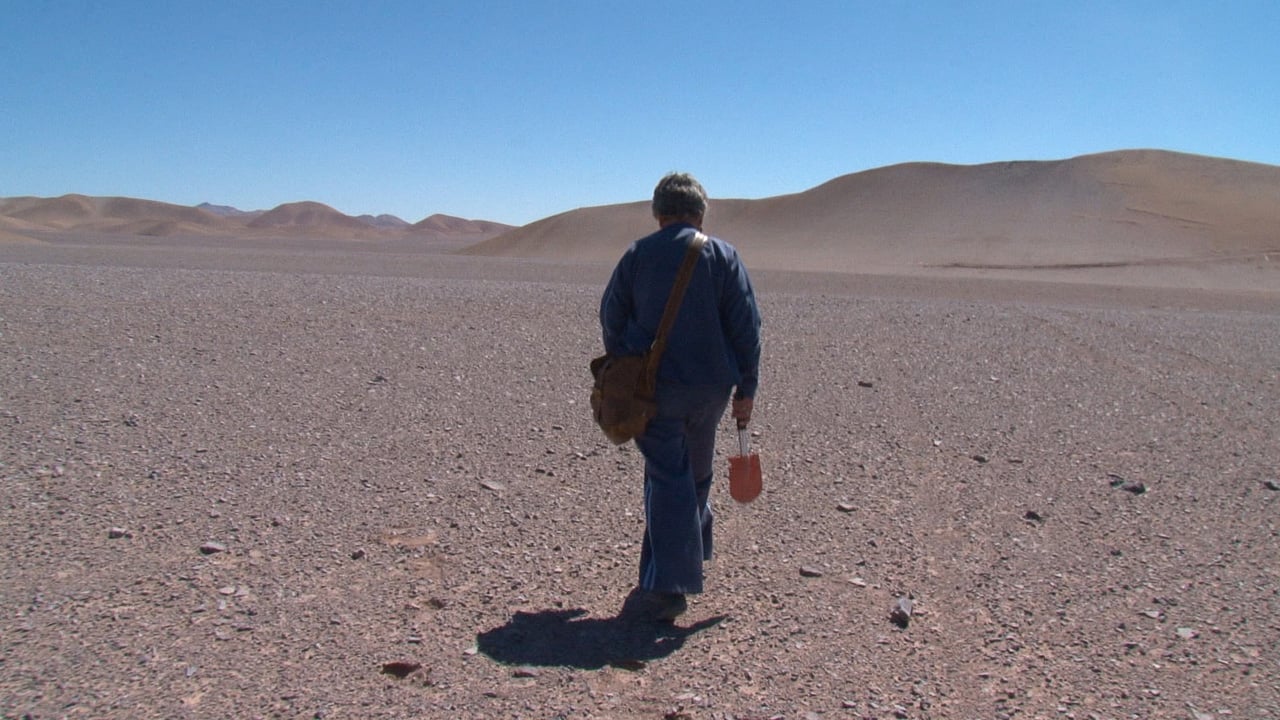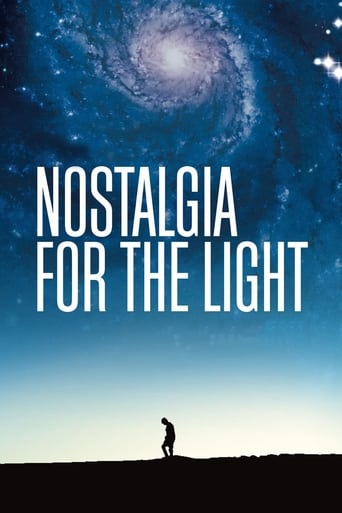ChikPapa
Very disappointed :(
Stoutor
It's not great by any means, but it's a pretty good movie that didn't leave me filled with regret for investing time in it.
Janae Milner
Easily the biggest piece of Right wing non sense propaganda I ever saw.
Phillida
Let me be very fair here, this is not the best movie in my opinion. But, this movie is fun, it has purpose and is very enjoyable to watch.
Raven-1969
The great telescopes of the Atacama desert, they look into the sky as well as our hearts. In our lifetimes the Pinochet regime tortured and/or killed over 60,000 people. This enthralling documentary, both sorrowful and hopeful, explores how stars, history and victims as well as survivors of an oppressive regime merge into one.The images of a body with legs still chained and wrists bound, people digging in the desert for remains of their loved ones, a country that does not acknowledge the recent past, the testimony of a woman who lost her parents and drawings from the Chacabuco concentration camp merge with images of galaxies and supernovas, and talk of a current of energy, new life, pulsing through our existence. It is powerful stuff. Transitions and better organization are all that are wanting with this film.
Ben Larson
This film is not a documentary in the traditional sense. It is more a work of poetry, or a spiritual experience.The brutal results of Pinochet's military dictatorship are meshed with the search for the origins of the universe. Both subjects deal with the past, as we only have past and future; there is no present as Augustine said many years ago.So, astronomers are really archaeologists. They study space to discover the past. Writer/director Patricio Guzmán combines this "archaeology" with the archaeologists who search the desert for the bodies buried by Pinochet.A fascinating story.
etvltd
This beautiful film will capture you emotionally, visually and intellectually. Patricio Guzmán's examination of light—its relationship to the past and what it illuminates of the future—is stunningly beautiful, insightful and very well shot. A scientist states early on in the film that there is no present only the past and future as the words he is forming with his mouth have already happened by the microsecond it takes for his voice to travel from his mouth to his subject's ears. It is this sort of abstract thought that permeates the films dialogue creating the mood.
ihrtfilms
Chile's immense Atacama desert is the setting for this stunning documentary that looks at the parallel between astronomers and relatives searching for remains of loved ones.We are firstly greeted with an array of huge vistas of space, images taken from the various telescopes trained on the universe. They are glorious to look at and so huge in scale they make you feel insignificant. As the film progresses we are introduced to a new story, that of The Disappeared, the thousands of people who went missing during the years of Chile's Pinochet regime in the 70's. We meet relatives who still hope that the remains of their loved ones will be found, so they can finally be laid to rest. Pinochet had a series of concentration camps in the Atacama desert, once they were salt mines. Prisoners were killed and their remains scattered through the desert. How many, or exactly where, is something unknown. For decades, relatives have come to the desert and spent countless days digging and searching for remains, body parts, fragments of bones. Occasionally remains are found, a closure for somebody somewhere.The relatives we meet are full hope that they will find the remains of the loved one missing for over 30yrs. They long to have that knowledge, that piece of mind and that's why they return. It is devastating to hear these people, all women, talk. They talk of the hope they have at the start of each day and the despair that takes over after a fruitless day. They talk of being able to die at peace if they find their loved one. The idea that in modern times such atrocities were committed and that even today such little is known is so disturbing, showing the true horrors that humanity can commit. Yet through this horror, there is hope, small groups of people continue the fight to find loved ones and recover the truth.The film draws on the parrallel that these two groups, the relatives and the star gazers lead simliar lives. They are both searching, searching for truth, for understanding. Both are working in the past, in that images from space are from the past, with light reaching us after something has happened, the relatives relive the past everyday hoping for some revelation. Somehow, despite the very obvious differences there is connection. Much of the connection and the film itself comes from the idea of space and scale. Footage of the Atacama shows it's immensity, small dots of humans work their way across tiny areas of a seemingly endless expanse. Mountains rise up, a toy like train crawls across the land. Even the telescopes are immense, the buildings they stand in, the mechanisms that run them are simply huge. The images, so huge and almost overwhelming fill the screen, just as the huge task that those searching for remains, searching for truth, fills the heart.It is a beautifully made film, that is at once both fascinating and immensely sad, but offers hope that perhaps we live in a better time and that people are have been able to help keep the past alive.More reviews at my site iheartfilms.weebly.com

